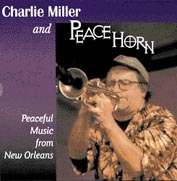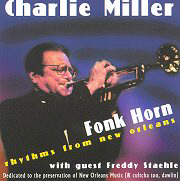by Renae Battaglia - Gulf Coast Arts Review

You may not know who Charlie Miller is, but you have probably heard
his music. This
accomplished musician has been playing music for over fifty years with
people like
B.B. King, Jimmy Witherspoon, and Dr. John. Last year he released his
first CD entitled
Peace Horn which features Miller playing a very soulful solo trumpet.
The music is clean
and because Miller plays solo, there is nothing that gets in the way
of the cry of his horn.
The music from the CD has been used on a 1998 episode of Homicide and
in an
independent film, Lucinda, which is pretty good exposure when you consider
that Miller
didn't do any national marketing.
A very versatile musician, Miller plays several instruments. "Trumpet
is my basic instrument,"
states Miller, "But I've been doing a lot of piano. One time I had
a job for about a year on
tuba with a piano player. But trumpet is what that I feel I have the
most ability on."
"When I moved to New York, I went from one music scene to the other.
I'd spend about
five to seven years in each one. I'm constantly learning, so I went
from one thing
to another. I did Broadway shows. Then I moved to the East Village
and played
loft sessions with the jazz players there. Then I worked with
the Latin bands. Then
Dr. John moved to N.Y., I worked with him. I loved music from the time
I was a child,
so I've taken the time to develop my interest and ability and learned
lots of styles of music,
I've worked for some of the best Latin bands, which have now become
legendary, during
the 70's in New York. And, I've worked with some of the best jazz musicians."
Miller worked with the New York Ballet Theater Orchestra at Lincoln
Center and in
Broadway shows like A Chorus Line and Annie Get Your Gun with the legendary
Ethel Merman. He also played with Thelonious Monk's band at Carnegie
Hall, the
Saturday Night Live Band, and the Tonight Show with Jay Leno.
Miller attributes his success to his devotion and hard work. "I've just
worked really hard,"
he says, "I practice for hours. I don't call on people looking
for jobs, I just work
really hard at my music and try to make myslf as good as possible at
what I do."
"A lot of guys have families, or they just get discouraged," continues
Miller, "or they get into
drugs or something, but for some reason or other they form a pattern
of not working hard.
Often young guys now think they can become a star real easy. They have
a certain look
and a certain type of presentation and they come out with an instrument
and they'll (the
music industry) makes them a star. Unfortunately the musicians are
the ones that are losing
out because they don't get to realize what they don't know. They just
become a star and
they think they know stuff. They become millionaires and the focus
goes on that. Then
they get big and their life gets empty and they get into drugs and
drinking and get angry.
"The music industry wants to make money. So they'll find a young guy
who's hardly
graduated from grammar school and give the kid the impression that
it's bad for him to
train himself; that he'll loose his soul if he trains himself.
So the kids come up believing
that; there's no way for them to learn what they should learn because
they're trapped
immediately by this industry.
"Some of the kids are so small they can hardly hold a horn and they're
being told not to
learn to play it well, that they've arrived. Actually,
I've lost at least one friendship
for saying this because it flies in the face of the music business,
but I have to say it
because these kids lives get ruined. They don't learn to take pride
in what they do.
The biggest valure for me in being a musician is I love what I do and
take pride in it
and I want to be very excellent at everything I do in music. People
who miss out
on that joy are missing out on the biggest joy of music. These
young people are being
deprived of their right as a musician to learn to play evey style of
music possible.
I'm not saying that the kids are at fault, but the people who are in
the business are in it
to make money, so they use hese kids and turn them into stars.
"I haven't said this in an interview before, but somebody needs to say
something like this.
You lose a lot of friends by saying this, but if I lose a friend or
two by saying this, okay,
well then maybe it was the type of friend I should have lost."
Miller plans to make another CD soon, although it probably won't be
anything like
Peace Horn.
"I've taken the time to look and listen to a lot of music. Because of
that I have a lot
of viewpoints. I can make a lot of unusual records and that's what
I intend to do.
My dream is to be an inspiration to people if I can."
"Almost everybody is making records that sound like other records. If
they make a Rhythm
and Blues record, they get a drummer, guitar player, keyboard, and
they sing. If they got
more money, they add horns. And they know exactly what the horns will
be, what they'll
sound like. It's copies of stuff we did in the 50's and 60's. That's
a type of record, and
record companies love this - to have a type of record so they can put
it in a type of bin,
and they already have the type of marketing so the type of audience
will go buy that type
of record. It's all predictable. It's all been done fifty years ago.
Music is not
doing what was done fifty years ago, it's making music. At this point
in my life,
at the age I'm at, I realize it's important for me to make music and
not make predictable
records. Records that people know what they are before they buy them.
I need to utilize
what God has given me which is a gift and ability to persevere so that
I can make unusual
records, and I can make unusual records that people like. I think that's
what musicains do
- they bring music into the world."



